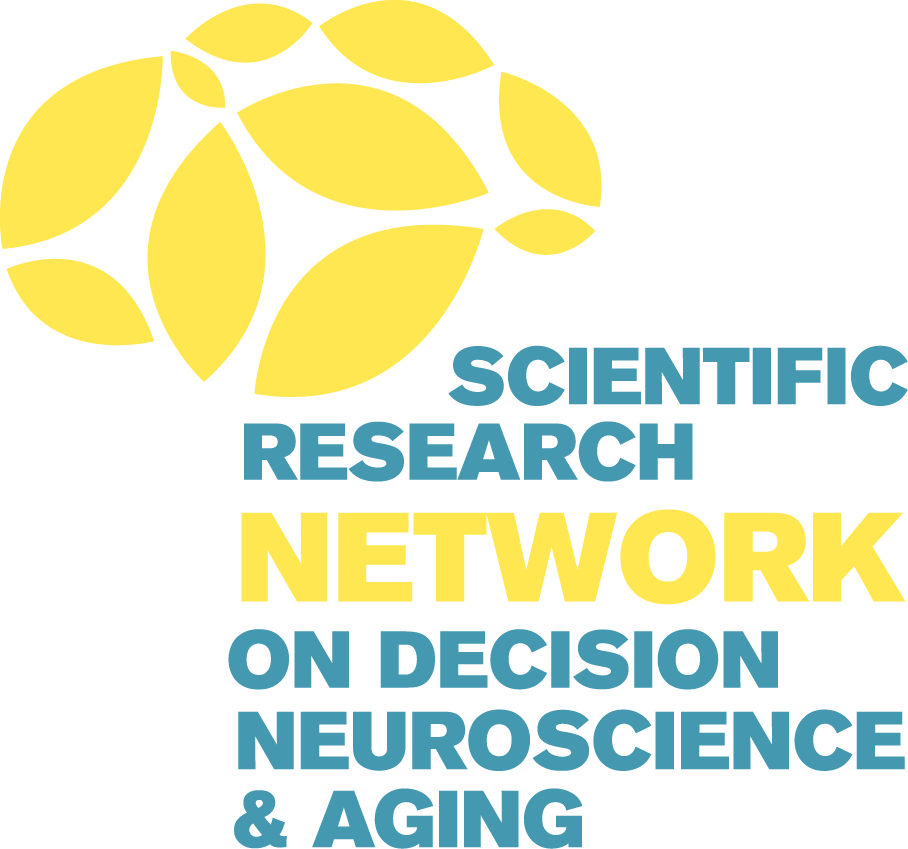Decision & Aging Insights Podcast

Listen to our podcast on Spotify, iHeartRadio, Amazon Music, or Apple Podcasts
September 2, 2025

In Part 2, of this two-part finale, the SRNDNA co-directors, Drs. Kendra Seaman, Nichole Lighthall, and Duke Han, discuss what the network has meant to them and what the future holds for SRNDNA.
These interviews were conducted separately, and the conversations have been edited for clarity and flow.
Co-Director section beginnings:
00:56 – Dr. Kendra Seaman
09:09 – Dr. Nichole Lighthall
25:25 – Dr. Duke Han
August 1, 2025

In Part 1, of this two-part finale, the SRNDNA co-directors, Drs. Kendra Seaman, Nichole Lighthall, and Duke Han, take us to the beginnings of the network, sharing the network’s impacts on their trajectories. They explain the importance of adding Alzheimer’s disease and related dementias to this recent round of funding. They also share their excitement about the special issue on Decision Neuroscience and Aging in JGPS series B.
These interviews were conducted separately, and the conversations have been edited for clarity and flow.
Co-Director section beginnings:
1:40 – Dr. Kendra Seaman
19:35 – Dr. Nichole Lighthall
28:37 – Dr. Duke Han
July 1, 2025

We spoke with Dr. Vishnu “Deepu” Murty, a 2022 SRNDNA Pilot Grant recipient and an associate professor of psychology at the University of Oregon. Formerly of Temple University, Dr. Murty describes his move across the country and what it’s been like to change institutions as mid-level faculty. He also shares how an experience at a haunted house inspired a method to study temporal memory. Dr. Murty is a proud queer scientist and chairs the Committee for an Inclusive Community at U of O.
June 2, 2025

We spoke with Dr. Sharon Noh, a 2018 SRNDNA Collaboration Award recipient and postdoctoral scholar at the University of California, Irvine. Dr. Noh shares how the Collaboration Award impacted her academic and professional journey. She also delves into her research on memory and learning conditions, offering insights into how we retain and process information to make decisions across the lifespan. As a mother of two, Dr. Noh reflects on the challenges and rewards of balancing an academic career with family life.
May 1, 2025

We spoke with Dr. Brittany Cassidy, an associate professor at the University of North Carolina at Greensboro. She shares the journey of receiving a 2018 SRNDNA Pilot Grant Award and explains her research on how perceptions can change with additional information. Dr. Cassidy received UNCG’s Thomas Undergraduate Research Mentor award in 2023 and describes what she enjoys most when mentoring students.
April 1, 2025

We spoke with Dr. Todd Braver, a professor of psychological and brain sciences, radiology, and neuroscience at Washington University in St. Louis. Dr. Braver is also the William R. Stuckenberg Professor in Human Values and Moral Development. He shares his mentoring experiences and what it’s like co-leading a lab. Dr. Braver also discusses the many aspects of his cognitive control research and his new collaboration examining the impacts of mindfulness training.
March 3, 2025

We spoke with Dr. Marilyn Horta, an active member of the SRNDNA network since 2015. She’s received SRNDNA’s Collaboration and Open Data awards. We discuss Dr. Horta’s research associated with the Open Data Award and her study on age differences in trust-related decision making and learning. Dr. Horta is now an applied research scientist at the Moffitt Cancer Center’s Tobacco Research and Intervention Program (TRIP) where she uses mobile health interventions for mindfulness-based stress reduction and to help people stop smoking.
AARP Fraud Watch Network: https://www.aarp.org/money/scams-fraud/about-fraud-watch-network/
Please note:
OpenfMRI should be OpenNeuro: openneuro.org
Feb. 3, 2025

In 2023 NIH created the Data Management and Sharing (DMS) Policy for all new applications. Dr. Luke Stoeckel, SRNDNA’s NIA Program Officer, and Dr. David V. Smith, an Associate Professor of Psychology and Neuroscience at Temple University, discuss the policy, the importance of sharing data, and the difficulties getting data into a sharable format.
Luke’s top 10 tips for those new to data sharing
David’s helpful resources/websites for psychology/neuroscience data sharing:
- https://bids.neuroimaging.io
- https://neurostars.org
- https://open-brain-consent.readthedocs.io/en/stable/
Dec. 2, 2024

We spoke with Dr. Jennifer Crawford, a postdoctoral fellow in the Neurochemistry and Cognition Lab at Brandeis University. We discuss Dr. Crawford’s 2019 SRNDNA Pilot Grant Award and how it set the course for her research career. She also explains Ecological Momentary Assessment (EMA) and how she uses daily life monitoring in her studies to get a more accurate glimpse into participants’ lives and activities.
Nov. 1, 2024

We spoke with Dr. Joe Kable, a member of the SRNDNA advisory board. Dr. Kable is the Jean-Marie Kneeley President’s Distinguished Professor of Psychology at the University of Pennsylvania and Director of MindCORE, U Penn’s hub for the integrative study of the mind. He shares with us the different methods of decision making and how those methods relate to life outside the lab. To learn more about the MindCORE Fellowship Program, visit https://mindcore.sas.upenn.edu/post-doctoral-research-fellowship/
Oct. 1, 2024

We spoke with Dr. Lisa Barnes, a member of the SRNDNA advisory board. Dr. Barnes is the Alla V. and Solomon Jesmer Professor of Gerontology and Geriatric Medicine at Rush University Medical Center and a cognitive neuropsychologist at the Rush Alzheimer’s Disease Center. She shares with us what it takes to be a good mentor, how she’s kept her MARS project going for 20+ years, and tips to connect with communities to diversify research participation.
Sept. 1, 2024

We spoke with Dr. Tanisha Hill-Jarrett, a neuropsychologist and assistant professor at Global Brain Health Institute, UC San Francisco. Dr. Hill-Jarrett’s research focuses on the cognitive impacts of racism and gendered racism on the Black community. We also discuss her creative aging program for Black women, Radical Imagination, and the use of Afrofuturism in her photo and interview project The Other Side of Time. Discover more about Dr. Hill-Jarrett and her research at https://www.tanishahilljarrett.com

You must be logged in to post a comment.